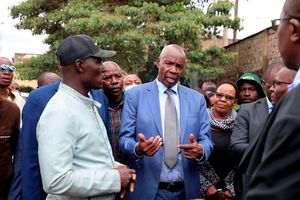Groups call for US help in Maasai eviction plight

US Vice President Kamala Harris (left) and Tanzanian President Samia Suluhu Hassan address a news conference in Dar es Salaam, Tanzania, on March 30, 2023.
Civil society groups now want the US to intervene in the ongoing eviction of Maasai in Loliondo, northern Tanzania, alleging serious human rights violations against the indigenous people.
The activists coalescing around the Pastoralists Indigenous Non-Governmental Forum and wrote to US Vice President Kamala Harris, calling for her intervention in getting the government of the East African nation to “immediately stop the ongoing seizure, auction and forfeitures of Maasai livestock and to restore Maasai grazing rights.”
The Forum, an advocacy coalition of indigenous peoples’ organisations, wants Tanzania to be compelled to observe national and international law, especially regarding human rights that recognise our rights to own and protect our lands.
“The government should respect international instruments, obligations and good governance principles, especially to respect pastoralism as a viable way of life,” says the Forum’s letter and calls on the US VP to help in getting Tanzania to halt the plan to take further Maasai areas to expand protected areas.
“The government should instead provide essential services to NCA (National Conservation Area) residents and immediately restore grazing rights to pastoralists in Ngorongoro and Loliondo,’ the letter says.
The Forum wants a commission of inquiry, supported by the US Government, to examine disputed lands and displaced people and to assist in the restoration of peace and compensation for rights infringements and losses by starting a meaningful dialogue between the Tanzanian Government and Maasai pastoralists.
Basic rights
They also want an end to the military special task force stationed in Loliondo “that intimidates and harasses anyone advocating for basic rights and seeking justice.”
Ms Harris visited Tanzania on March 30, 2023, to discuss the interests of the two countries at a global scale, but the indigenous Maasai have taken a stand that global interests will not trump their interests—as the indigenous occupants of northern Tanzania and Southern Kenya.
Tanzania has been unable to deal with the displacement of the Maasai community in Loliondo and the Ngorongoro Conservation Area (NCA).
According to the activists, an estimated 80,000 people have been evicted from Loliondo and Ngorongoro while 90,000 Maasai in the latter region are without access to basic services such as healthcare.
The Forum also claims that some 600,000 livestock have been killed by drought due to restricted access to water and grazing and ten thousand others have been auctioned by the Tanzania government.
“Having already given up our rightful claim to land to establish the Serengeti National Park in 1959, we reasonably expected that the government would abide by the agreement to defend our customary land use rights,” the letter to Ms Harris reads.
There has been an ongoing struggle between the indigenous Maasai people of Tanzania and the Tanzanian Government since 1992. It revolves around repeated attempts by the Government to take Maasai village land and designate it as a game reserve for trophy hunting.
Despite the community’s repeated pleas to the government to leave them alone, the evictions have gone on relentlessly for years.
Forcibly evicted
It goes on: “On each of three occasions, in 2009, 2017 and 2022, Maasai people have been forcibly evicted from land previously legally accessible to them for grazing cattle and building their rudimentary homes (bomas) and civic infrastructure, such as primary schools, clinics and dispensaries.”
On June 8, dozens of police vehicles from the anti-riot Field Force Unit (FFU) arrived in Wasso town in Loliondo, Ngorongoro district, to demarcate the area as a Game Reserve. The FFU and other forces also set up camp in the region.
In the following two days — June 9 and 10 – locals gathered in several locations, including Ololosokwan and Kirtalo, to protest the police invasion. This provoked a high-handed reaction from the police and paramilitary forces who allegedly dispersed people at a traditional ceremony.
The Regional Commissioner of the Tanzanian government met with village chairmen to inform them of the government’s decision, despite the East African Court of Justice (EACJ) having ruled in favour of the Masaai community in 2018.
On May 25, 2022, the community submitted to the Prime Minister a report and request for dialogue after suggestions of new evictions from ancestral Maasai land, previously registered to pastoralist villages. Yet on June 7, 2022, a paramilitary group of around 700 people, mostly police, park rangers, military, and other Government funded armed security forces arrived at Loliondo, instigating social unrest and public panic.
Over 400 military rangers from a special unit remain in Loliondo.
The Ngorongoro is a multiple land use Area covering 8,392 square kilometres, with 98,000 Maasai pastoralists. Both the community of NCA and Loliondo were evicted from the Serengeti by the British colonial government in 1959.
In the past five years, some government agencies and officials have suggested without evidence that the Maasai population should be moved out of Ngorongoro because of population growth. In 2022 the government began a strategy they call “voluntary” relocation.
The letter said that the government stopped providing funding to support essential services like health dispensaries and schools.
According to the letter, the Tanzanian government evicted 3450 people from their homes and closed four nursery schools, nine permanent water sources, including nine dams, and six health mobile clinics.
Prioritise tourism
The group also claims that the Government “Provided poisoned saltlicks to Maasai pastoralists resulting in the deaths of an estimated 10,365 cows, 9,541 goats, 16,574 sheep, and 394 donkeys.”
According to Anuradha Mittal, the Executive Director of the Oakland Institute and author of Losing the Serengeti, the fact that the Maasai are once again facing eviction to please the UAE Royal Family shows the Tanzanian government continues to prioritise tourism revenues at the expense of the indigenous pastoralists.
“The Maasai, who are the indigenous community, are appealing for international support so that their land and rights are respected. The myth of ‘protected areas’ takes away not only their rights as people but their ability to live in their ancestral land,” said Ms Mittal.
In a related development, scientists working in East African conservation landscapes, have written to the Tanzanian government saying they are concerned about these recent developments occurring in Tanzania in the name of conservation.
They cite violations including the physical violence and other human rights violations against Maasai communities in Loliondo since June and the ongoing efforts to evict Maasai men, women, and children from Ngorongoro Conservation Area.
They say that the recent decision to evict Maasai from their homelands goes against the Tanzanian Government’s policies that seek to promote local participation in conservation, with an emphasis on environmental sustainability and poverty alleviation (for instance the National Human-Wildlife Conflict Management Strategy (2020-2024).
Conservation
“In Tanzania, local communities live on legally registered village lands while they actively participate in conservation efforts. This approach to conservation with local communities is in accordance with several Sustainable Development Goals (SDG3 - Good Health and Well-being, 10 -Reduced Inequalities, 15 - Life on Land, and 16 - Peace, Justice, and Strong Institutions) and is promoted by the International Convention on Biodiversity Conservation. Tanzania has committed to following both sets of global guidelines,” the scientists say in their letter.
It says that the Tanzanian Government has implemented a policy resulting in the daily starvation of livestock from 28 villages. The government levies a fine equivalent to $45 for each cow.
Tanzania is a signatory to the United Nations Declaration for The Rights of Indigenous People (UNDRIP) which underpins the principle of free, prior, and informed consent. Tanzania signed the declaration on September 13, 2007, and officially endorsed it on September 17, 2007.
The declaration recognizes and affirms the rights of indigenous peoples, including their right to self-determination, their rights to their traditional lands, territories, and resources, and their right to maintain and develop their own cultures, languages, and traditions.
The scientists say the evictions of Maasai risk destroying Tanzania’s global reputation of national and international conservation achievements, asserting that conservation with local communities – not against them - should be the foundation of current conservation and tourism efforts.





